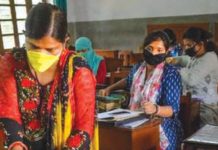
Paralegal workers under the Narmada Mahila Sangh, a federation of women’s collectives in Betul district of Madhya Pradesh, are extending moral support to victims of marital abuse, reports DEEPANWITA GITA NIYOGI
In Madhya Pradesh’s Betul district, paralegal workers under the Narmada Mahila Sangh are helping survivors of domestic violence by extending full-fledged support to them. For the victims, it is not easy to approach the police due to the fear of social stigma. Many women are also abandoned by their families and defamed by neighbours for raising their voice. But the paralegal system is giving them moral support.
PRADAN (Professional Assistance for Development Action) executive Clara Mallik based in Betul said that the Narmada Mahila Sangh (NMS) has been functional since 1999 though it formally got registered in 2009. It is a federation of 15,000 marginalised women’s collectives. “As part of an UN women project, the non-profit carried out gender training at the village level and held discussions on patriarchy in Betul. An important issue which came up was domestic violence,” she said. Thus, to handle the issue, paralegal workers were created.
The paralegal workers are members of NMS and a few are survivors of domestic violence themselves. They are certified workers and have been working at the grassroots level after receiving due training. Mallik added that some of these women have witnessed gender violence either during their childhood or after marriage. When they started counselling women in several villages of Betul, many cases of abuse came to the fore. Though the paralegal workers helped in spreading awareness, some victims are still hesitant till date to approach the police.
Domestic violence in villages
Often it becomes problematic for women to stay in villages after they register police complaints against their husbands and in-laws. So, village-level meetings are organised to support them. If a woman wants resolution at the village level, it is also extended. Mallik pointed out that it takes a lot of courage to stand up against domestic violence in rural areas where women are poor and not much educated. Sometimes, victims have to wait for days for FIRs to be lodged.
The real challenge, however, starts after court hearings. Most victims cannot afford travel cost to appear in courts due to financial constraints. Sometimes, paralegal workers also get threats. To overcome such impediments, village level meetings are organised to mobilise support for victims.
Paralegal worker Geeta Chauhan is a resident Salimet village in Betul. She wanted to work on women’s issues and joined the Sangh in 1999. “I received training for 14 days. It came to the fore that nothing was being done to rescue women from domestic violence and marital abuse. So, now when cases come to us, we talk to women and their family members. After a woman files a complaint, there is always an upheaval at her house. But it does not mean that they will continue to be abused. Sometimes women also compromise. But a lot of change is taking place on the ground and it is encouraging,” Chauhan explained.
Another paralegal worker, Anita Bamne from Koylari village said, sometimes women are scolded by husbands and many put up with violence even after doing all household work. Bamne said when work was divided between men and women; it came to the fore that women worked more. Apart from housework, they worked in the fields and also did MGNREGA jobs.
“We have spoken to a lot of women about gender discrimination and what should be the ideal situation in a marriage. We advise them that men and women have the same rights and that all members of the family should divide the work burden. Now, men are helping their wives to some extent. We do regular follow ups to ensure this. Now, some husbands wash clothes, chop vegetables and even sometimes help with cooking. Every month we hold meetings with the women at the village level,” Bamne pointed out.
Bamne has studied till class 8 and received training in paralegal work. Women call us and share their experiences. If they want to lodge complaints, we extend full support. Sometimes we too face threats but that does not deter us, she added.

Helping women
Kartikeyan Krishnamoorthy, former Betul superintendent of police, said that the Madhya Pradesh State Legal Services Authority also has paralegal volunteers, who act as a bridge between the public and the police. These workers help the public in accessing a lot of benefits.
“My role was to tie up people with the Narmada Mahila Sangh, which also has paralegal volunteers. Many women are wary of coming to the police station because of societal pressures. Sometimes, the police also do not encourage them. If some women want to settle matters, they can come for family counselling instead of lodging FIRs. There are family counselling centres across the state,” Krishnamoorthy, who was posted in Betul from 2018 to 2020, said.
Nupur Sinha at the Centre for Social Justice said that her organisation has pioneered the work on paralegalism and tried to improve paralegal training. “We have trained over 3,400 paralegals through partnership networks. It has helped the workers gain legitimacy in the formal system. PRADAN too wanted to train women paralegals. So, it was a year-long hand holding support. These women are not much literate but it gives them advantage as they understand life and relationships. We begin by discussing that violence against women is not acceptable.”
Some paralegal workers are making a mark. Mamta Pandram has been to Mussoorie thrice in 2017, 2018 and 2019. Her sessions last for two hours where she explains to IAS officers about working at the ground level. The mahila sangh also organises annual meetings every year known as mahadhiveshan. It is a gathering of more than 1000 women. The purpose is to send a message of solidarity, celebrate achievements and review and redefine its purpose. Mallik said the Sangh paralegal system has created moral, economical and social support for survivors. It is not an easy journey for paralegals to work with minimum resources but they are doing their best.
tehelkaletters@gmail.com













